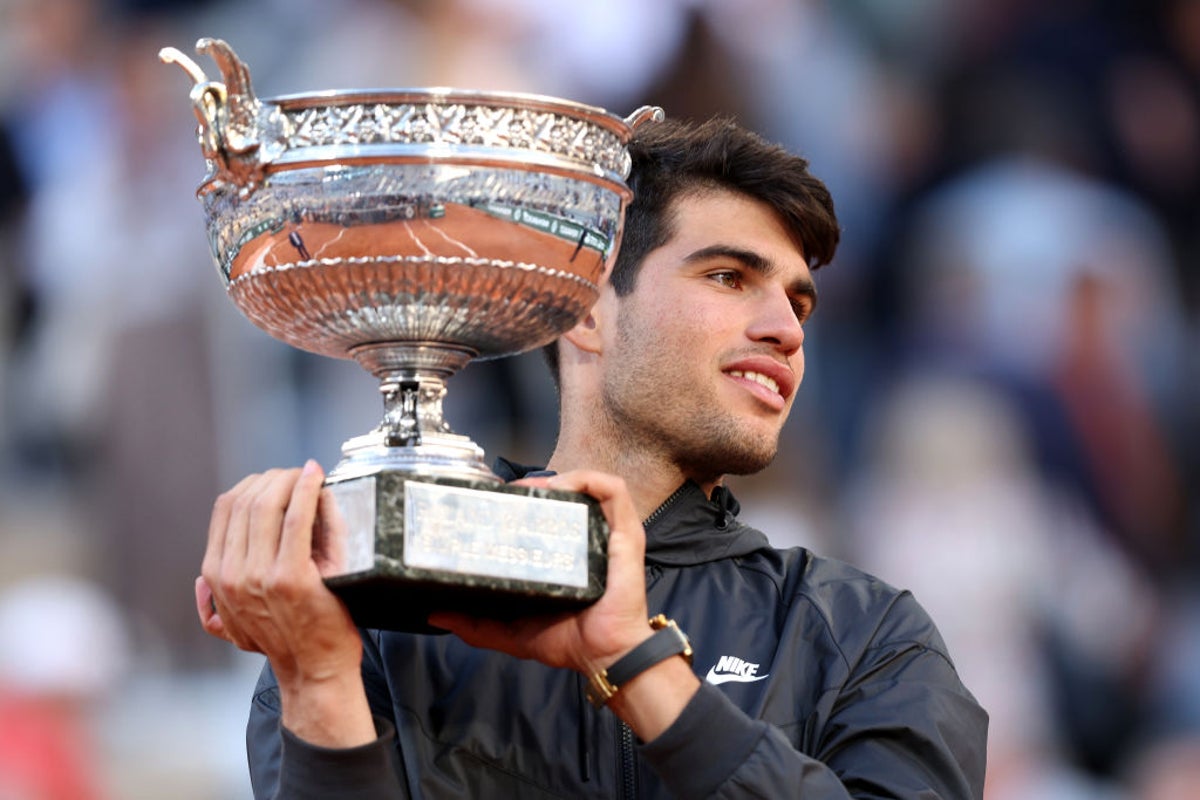A first-time French Open champion will be crowned Saturday: Will it be No. 1-ranked Aryna Sabalenka or No. 2 Coco Gauff? Sabalenka has three Grand Slam titles to her name, while Gauff has one -- but neither has won at Roland Garros before.
Our experts weigh in on how each could pull off the victory.
What can Gauff do to defeat Sabalenka?
Rennae Stubbs: Gauff has to serve above 60% first serves in, or she will have a hard time holding serve consistently enough. If she can do that and keep the scoreboard pressure on, she can win. Her speed on court means she can run enough balls down and stress Sabalenka into errors, but Gauff cannot serve badly, and she needs to keep her double faults in check.
Pam Shriver: Gauff needs to have good day accelerating on her forehand, get a high percentage of first serves in, and use her extraordinarily speed to play top-shelf defense. It's a head-to-head that's dead even. And it's always special to have No. 1 versus No. 2 in a major final.
Simon Cambers: Gauff has the game to trouble Sabalenka. That's the most important thing, mentally. The backhand to backhand is going to be crucial. If Gauff can get most of the rallies on her terms, then she has a chance to win most of the baseline contests. She will need to serve a high percentage of first serves, though, because Sabalenka will hammer the second serve unless Gauff manages to get it out of her hitting zone.
Her tenacity will be key. Throughout the tournament, Gauff has shown huge mental strength to get out of difficult situations, and the power of the Sabalenka game means she will come under pressure at times.
D'Arcy Maine: With a final appearance on the line and against not just her opponent but 15,000 or so fans in the stands, Gauff played arguably her best and most complete match of the tournament on Thursday. She's proved just how mentally tough and composed she can be, even in the biggest moments, and she should be feeling more confident than ever after her decisive win over Loïs Boisson.
Not to mention, she's beaten Sabalenka before in a major final and she has been in this position before at Roland Garros. If she can bring all of that self-belief, experience and emotional maturity, in addition to a strong serving outing and her trademark court coverage and defense, a second Slam title feels well within reach.
Bill Connelly: This has been such an odd series, with neither player creating any long-term advantages over the other and the momentum shifting back and forth. Gauff's serve works, then it doesn't. Sabalenka dominates with her serve in one match, then leaves the door open with the second serve in the next.
Honestly, this is the worst, most obvious advice in the world, but Gauff's title odds increase significantly if she simply lands her serve. When she's hitting over 55% of her first serves, she's 5-2 against Sabalenka; she's 0-3 when she doesn't hit that mark. So let's start there. She'll probably find opportunities to break Sabalenka, but only if her serve doesn't dig her too big a hole.
Tom Hamilton: Consistency. Gauff can't afford to have those mid-match slumps on serve and accuracy. So she has to keep her foot down the whole way through. As Sabalenka showed against Swiatek, she has the means to find another level in the closing stages of the match. So Gauff really has to get this done in two.
As D'Arcy says, she's already learned to cope with a partisan crowd, but I think this one will see the Chatrier faithful split between the two. Gauff has the experience of playing a major final at Roland Garros, and will channel that disappointment into Saturday's match. She simply can't let Sabalenka get a foothold.
What can Sabalenka do to defeat Gauff?
Stubbs: Sabalenka has to take advantage of the second serve when she can and press Gauff's forehand. She also needs to serve well. If she doesn't serve well, Gauff will win the longer, more physical points. Sabalenka cannot overpress but has to come in and shorten the points and not let Gauff grind her down physically and mentally.
Shriver: Sabalenka just needs to keep playing confident tennis, using her Serena-type power game plus her added finesse plays that have flourished since Gauff beat Sabalenka at the 2023 US Open final. The crowd will not have the kind of impact in this major final that it had when it helped Gauff to the win her first major 20 months ago. Sabalenka is enjoying the No. 1 ranking as much as anyone in recent times, as her mental strength is now just as strong as her physical strength.
Cambers: Sabalenka will believe that if she plays her best, she will win. That's based on form and the way she plays, as well as past performances, even if they're level at 5-5 in previous meetings. She needs to serve well, but will be all over the Gauff serve, whenever she misses her first serve.
There's so little margin for error in the Sabalenka game, but as she did in the semifinal win over Iga Swiatek, when she needs to, she can rein it in and play with more spin and more safety, even the odd drop shot. Gauff moves brilliantly, but Sabalenka has great touch so when the rallies do go deep, she has options.
Maine: Play exactly like she did in the deciding set against Swiatek? If she does that, it's hard to think anyone could stop her. But as Simon mentioned, Sabalenka and Gauff have an even head-to-head record, which shows just how well matched they are.
Sabalenka won their most recent meeting 6-3, 7-6 (3) in the final in Madrid last month and, in addition to the confidence boost of that victory, it gives Sabalenka somewhat of a blueprint of what she'll need to do Saturday to win again on clay. Much like what she did against Swiatek on Thursday, Sabalenka came out with her foot on the gas, dictating the pace and making Gauff uncomfortable from the start. While Gauff raised her level, Sabalenka then did too.
And that's exactly what Sabalenka has done throughout the fortnight in Paris -- she simply keeps finding ways to win and her game seems to improve with every match she plays. If she can focus on the match at hand, and not the enormity of the moment, the trophy is hers to win.
Connelly: Over the last year, these two have played three times. When Gauff beat Sabalenka in straight sets in Riyadh, she won 13 of 17 points (76%) that lasted seven or more shots. When Sabalenka won a three-setter in Wuhan, she took 17 of 31 (55%). And in Madrid, their only meeting on clay in the last four years, Sabalenka won 13 of 24 such points (54%).
If Sabalenka is able to avoid pressing and making mistakes in the face of Gauff's speed and defense, and if she's able to at least split those longer points, that closes off a major potential avenue of success for Gauff and forces her to match power for power on shorter points. That tilts things quite well in Sabalenka's favor.
Hamilton: She simply has to stick to what's worked so far. She has the shot variety to trouble Gauff and she'll punish any wayward second serves. If she finds the level she did in that third set against Swiatek, then no player on the planet can cope with that. Sabalenka won't be fazed by this occasion in the slightest and will be confident of victory. She's appeared at ease at Roland Garros over the past fortnight and has been quick to deflect pressure elsewhere. That quiet confidence is ominous and you feel that if she finds the Swiatek-type level of controlled aggression, then she's the favorite.
Who will win?
Stubbs: Slight, and I mean slight, edge to Sabalenka in three sets.
Shriver: Sabalenka wins in three sets.
Cambers: Sabalenka feels she needs to win this to be considered as one of the all-time greats and that is the extra motivation she needs to get over the line. More than anything, though, she has very few holes in her game, while Gauff has issues with her serve and forehand, which can both break down under pressure.
In some ways, Gauff may feel she has nothing to lose, which could make her dangerous, but when the heat is on and things get tough, though she has great mental fortitude, it probably won't be enough. Sabalenka in two sets.
Maine: Sabalenka in three sets. I picked Gauff at the start of the tournament, but Sabalenka's near-masterclass against Swiatek has made me rethink this. Having seen her play at such a high level against the three-time defending champion and knowing how much she would like to win a non-hard-court major and also avenge the 2023 US Open final, a Sabalenka win feels all but inevitable.
Connelly: With the way the momentum shifts in this series, a three-setter wouldn't be a surprise at all. And when in doubt, I'm just going to go with the better overall player. Sabalenka is 40-6 this year, she's reached the finals of five of her last six Slams, and she just took down the queen of Roland Garros in the semifinals. Gauff was brilliant in the semis and will give herself a solid chance if she's landing her serve, but Sabalenka is the best player in the world, and while she doesn't always win her finals, we'll say she takes this one.
Hamilton: Okay so everybody has gone with Sabalenka. So to be contrary, it's Gauff's time. I remember sitting in her post-match press conference after she lost the title to Swiatek in 2022. She was devastated, but there was also this quiet resolve that if she got the chance again, she wouldn't let it slip. Rhyme and reason say this is Sabalenka's title, but the unquantifiable quality of Gauff's quiet resolve will sway this title in her favor. She simply has to land those first serves, and not let Sabalenka get a foothold. If she comes out of the blocks flying, then it's Gauff's title.
.png)
 German (DE)
German (DE)  English (US)
English (US)  Spanish (ES)
Spanish (ES)  French (FR)
French (FR)  Hindi (IN)
Hindi (IN)  Italian (IT)
Italian (IT)  Russian (RU)
Russian (RU)  11 hours ago
3
11 hours ago
3







Comments